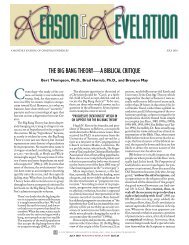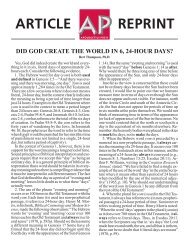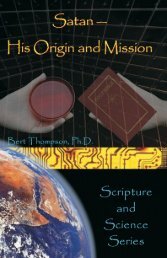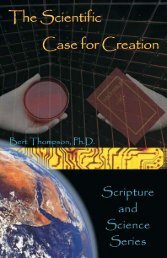The Many Faces, and Causes, of Unbelief - Apologetics Press
The Many Faces, and Causes, of Unbelief - Apologetics Press
The Many Faces, and Causes, of Unbelief - Apologetics Press
Create successful ePaper yourself
Turn your PDF publications into a flip-book with our unique Google optimized e-Paper software.
Smith’s point is well taken. Is it not possible that the agnostic<br />
is avoiding—purposely—the evidence for the existence <strong>of</strong><br />
God? Rather than being unable to know, perhaps the agnostic<br />
is unwilling to know. Sir Hector Hetherington, Principal<br />
Emeritus <strong>of</strong> Glasgow University, addressed this concept when<br />
he said:<br />
<strong>The</strong>re are issues on which it is impossible to be neutral.<br />
<strong>The</strong>se issues strike right down to the roots <strong>of</strong> man’s<br />
existence. And while it is right that we should examine<br />
the evidence, <strong>and</strong> make sure that we have all the<br />
evidence, it is equally right that we ourselves should<br />
be accessible to the evidence (as quoted in Samuel,<br />
1950, p. 29, emp. added).<br />
<strong>The</strong> agnostic is perfectly capable <strong>of</strong> making himself “accessible<br />
to the evidence.” <strong>The</strong> question is—will he? Or will he<br />
choose instead to hide “behind a screen <strong>of</strong> ‘can’t know’ ”?<br />
SKEPTICISM<br />
<strong>The</strong> skeptic is the person who doubts there is a God. <strong>The</strong><br />
st<strong>and</strong>ard dictionary definition is quite revealing when it describes<br />
a skeptic as one who holds to “the doctrine that true<br />
knowledge or knowledge in a particular area is uncertain <strong>and</strong><br />
who has doubts concerning basic religious principles.” Notice<br />
that the skeptic does not claim knowledge <strong>of</strong> God’s existence<br />
is unattainable (as in agnosticism), but only “uncertain.”<br />
However, the skeptic does not stop at mere “uncertainty.”<br />
In fact, skepticism “...confidently challenges not merely<br />
religious or metaphysical knowledge but all knowledge claims<br />
that venture beyond immediate experience”(Encyclopaedia Britannica,<br />
1997b, 26:569, emp. added). <strong>The</strong> key words here are<br />
“immediate experience.”<br />
Translated into common parlance, this simply means that<br />
the skeptic is not prepared to accept anything that cannot be<br />
verified empirically (viz., via the scientific method). Corliss<br />
Lamont, famous twentieth-century skeptic <strong>and</strong> humanist,<br />
wrote:<br />
-20

















